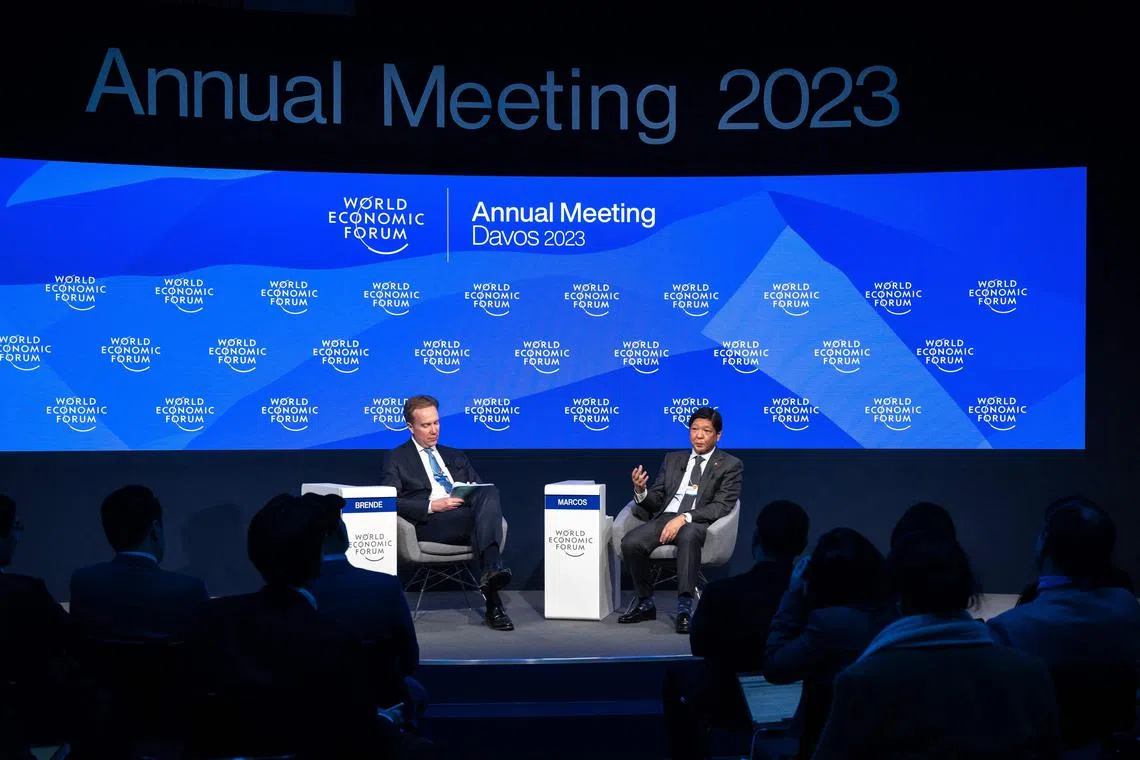Davos 2023
‘I am on the side of Philippines,’ says President Marcos
Philippine President charms global audience with promise of neutrality, higher growth
Sign up now: Get insights on Asia's fast-moving developments

Philippine President Ferdinand Marcos Jr (right) with WEF president Borge Brende during a session at the World Economic Forum on Jan 18.
PHOTO: AFP
DAVOS, Switzerland - He was seen, he was heard, and he must have ended up with many new friends.
Philippine President Ferdinand Marcos Jr, who has been in office for just seven months, was on a charm offensive with the elite crowd at the World Economic Forum’s (WEF) Annual Meeting 2023.
Over a series of public meetings – there were four on Wednesday and a few more the previous day – he strode into rooms packed with potential foreign investors, business captains, officials and international observers, promising a commitment to peace and a bright future for his country during his tenure.
Manila will maintain its neutrality between Washington and Beijing and push hard to win its bet with the International Monetary Fund (IMF) on economic growth in 2023, Mr Marcos said, highlighting his priorities during a conversation with WEF president Borge Brende, at one of the last meetings of the day on Wednesday.
Caught between maintaining his historical relations with the United States – these are now more than a century old, he told the audience – and ties with China that blossomed after the visit of his mother Imelda Marcos in 1974, he said the increasingly bipolar nature of geopolitical forces was making things more complex.
The Philippines will navigate the way forward while keeping the best interests of its people, he said.
“I am not on the side of Washington. I am not on the side of Beijing. I am on the side of the Philippines,” Mr Marcos said, to a round of applause from the audience.
But tensions over the South China Sea are keeping him awake both at night and in the day,
Beijing is now Manila’s biggest trading partner, but relations have been tense over the passage of Chinese warships in the region.
Manila is watching as a “bystander” whenever those of China or the US cross the waters, he said.
The situation is “very dynamic, it is constantly in flux”, Mr Marcos said. “So you have to pay attention to it to make sure that you are at least aware of the present situation, so that you’re able to respond”.
The Philippines, together with other economies of South-east Asia, has been at odds with China over territorial rights in the South China Sea.
Both agreed to resolve their differences through “friendly consultations” during his visit to Beijing.
Manila’s policy is driven by his country’s “commitment to peace”, Mr Marcos told the audience.
His more immediate priority is to resist “recessionary forces” and ensure the creation of new jobs in a country teeming with a younger workforce – the average age of workers is only 23.5 years.
“My belief is that as long as the unemployment rate stays low, we will be able to resist the recessionary forces.”
His government is looking at strengthening partnerships, reforming the bureaucracy, and investing in agriculture and infrastructure, among several initiatives.
“The biggest contributor for foreign direct investment now is Singapore, into the Philippines,” Mr Marcos noted. “Japan and Korea are following on its heels. So it’s very much regional.”
Technology, mining and remittances from overseas workers count for much.
Maintaining that he was “very optimistic and very confident of the future”, he said: “In fact, we have sort of a bet going on with Madam (Kristalina) Georgieva of the IMF. They predict a growth rate of 5 per cent for the Philippines, and we have said our projection is 6.5. And we’re still hoping that it will be able to grow beyond that.”
In other meetings at the Forum, President Marcos championed the first sovereign wealth fund his government is working on.
“Such a fund is one tool among many in our efforts to diversify our financial portfolio, which includes our existing institutions pursuing investment that will generate stable returns,” he said at an earlier meeting.
Asked by Mr Borge if he had the ambition to be president during his father’s time, Mr Marcos was forthcoming and said he disliked politics, but the decision was a consequence of the realities of the time.
The return of his family to the Philippines in 1991 – after his father went into exile in 1986 in Hawaii, where he stayed till his death – became a very political issue.
“For us to defend ourselves politically, somebody had to enter politics and be in the political arena,” Mr Marcos said.
“And so upon arrival in ’91, the following election was in ’92, I immediately ran for congressman in our province, at the House of Representatives.
“And you know life takes you to certain... places that you did not expect. And so once I was entrenched in the political arena, I said, well, if we’re going to do this, you better do it well,” he shared.



